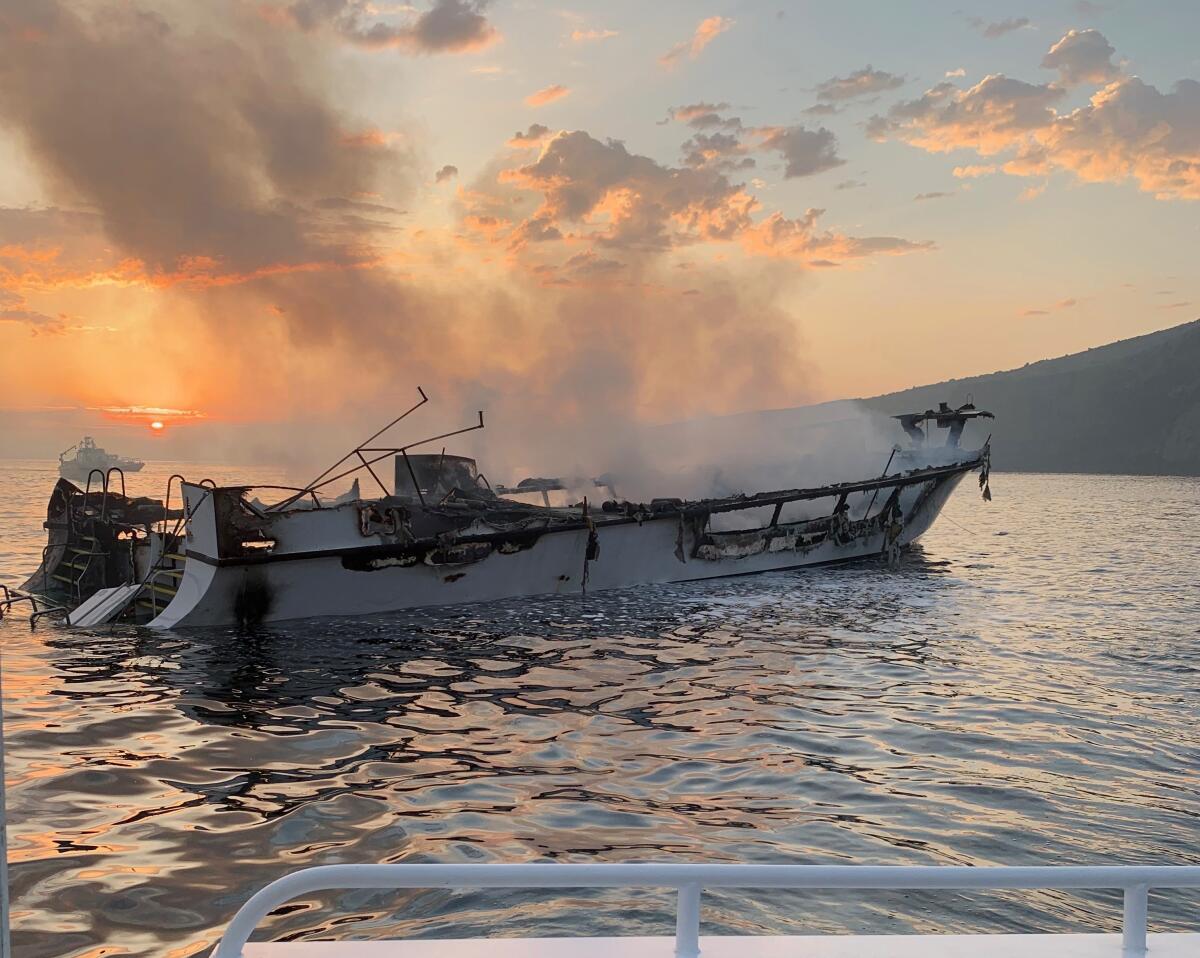Deadly boat fire: Four families of victims file suit against Conception owners

Four families whose relatives were among the 34 people killed in a fire on Labor Day aboard the dive boat Conception are suing the vessel’s owners, alleging they failed to have a roving watch required by the Coast Guard, had insufficient fire suppression and detection, and had inadequate means of escape.
Documents filed in federal court allege that the vessel, which was owned by Truth Aquatics, was “unseaworthy” and that its captain, Jerry Boylan, failed to properly implement required watch policies and procedures meant to detect emergencies such as a fire.
A preliminary report by the National Transportation Safety Board found that no one was designated as a roving watch at the time the blaze engulfed the Conception off Santa Cruz Island, killing everyone who was sleeping below deck. The captain and four other crew members sleeping above deck managed to escape.
The filings Monday come after attorneys for Truth Aquatics’ owners, Glen and Dana Fritzler, filed a petition in federal court to limit the payout to the families of the Conception victims. They cited a steamship maritime law, the Limitation of Liability Act of 1851, in asking a judge to eliminate their financial liability or lower it to an amount equal to the post-fire value of the boat, or $0.
But attorneys Robert Mongeluzzi, one of the nation’s leading experts on maritime liability, and Brian Panish contend in court papers that the conduct of Truth Aquatics means the vessel’s owners aren’t covered by that law.
Mongeluzzi contends the Limitation of Liability Act of 1851 doesn’t apply because the Conception was operated “in a willful, wanton, and reckless manner” and that the “unseaworthiness” of the vessel caused and contributed to the deaths.
He added that the Fritzlers “heartlessly and callously filed a limitation of liability action before the bodies had been recovered or identified.”
Boylan, Glen Fritzler and his attorney, Hilary Potashner, did not respond to requests for comment.
The cause of the fire remains under investigation, with the Bureau of Alcohol, Tobacco, Firearms and Explosives conducting extensive testing to assist. It is believed to be the worst maritime disaster in modern California history.
Some boat safety experts have pointed to the charging of lithium-ion batteries — which have become a staple for divers who use them to power underwater equipment such as lights, cameras and scooters — as a possible starting point for the blaze.
The lawsuits allege Truth Aquatics “encouraged crew members and passengers” to use the ship’s electrical system to charge phones, cameras, strobe lights and other devices in an area directly above where the passengers slept. They claim the company knew about the dangers of lithium-ion batteries from a fire a year earlier on another of its boats, but took no steps to add safety measures, according to the filings.
The Times first reported the fire aboard the Truth Aquatics boat Vision last month. In that incident, a lithium-ion battery began to smolder as it was charging. An alarmed crew member quickly tossed it into the water, preventing the blaze from spreading, a witness and several sources told The Times.
Coast Guard inspectors in California didn’t know about the previous fire aboard the Vision until The Times requested details about it.
After the fire, the Coast Guard for the first time recommended that owners of passenger vessels immediately urge crews “to reduce potential fire hazards and consider limiting the unsupervised charging of lithium-ion batteries and extensive use of power strips and extension cords.”
Among damages, the lawsuits seek compensation for medical, funeral and burial expenses, lost wages and the economic loss to the victims’ estates. The suits were filed by the families of passengers Yulia Krashennaya, Kaustubh Nirmal, Sanjeeri Deopujari and crew member Alexandra Kurtz.
Attorney Jeff Goodman, who is also representing relatives, said a roving watch on the Conception could have saved lives. “The lack of night watch is one of the truly egregious acts by the captain in this case,” he said.
“The issue is even more important in today’s day and age because at night while people are sleeping down below you have batteries that are charging that pose a safety risk,” Mongeluzzi said. “Some of Truth Aquatics’ own captains have been quoted in the press acknowledging they did not have regular patrols. That is a violation of federal law.”
A Times investigation found that other captains with Truth Aquatics said they didn’t have formal roving watch schedules even though the boats’ certificate of inspection requires a crew member to be designated “as a roving patrol at all times, whether or not the vessel is underway, when the passengers’ bunks are occupied.”
In the days after the fire, a statement from an attorney representing Truth Aquatics said a crew member had checked the area where the fire broke out about half an hour earlier and found nothing unusual.
The fire is now the subject of a criminal investigation by the Coast Guard and the FBI that’s overseen by the U.S. attorney’s office, in addition to probes by the National Transportation Safety Board and the Coast Guard Marine Board of Investigation.
The NTSB’s preliminary investigation found that the crew members were sleeping in a berth behind the wheelhouse when the fire broke out. By the time they awoke and jumped down to the main deck, they found the galley and salon engulfed in flames. The main bunk room where their 33 customers and a fellow crew member slept lay directly below, in the belly of the boat.
Goodman pointed out there was no sufficient means of escape for the people below deck. “It gave them no way to get out and it resulted in 34 horrific, agonizing deaths,” he said.
Mongeluzzi said Boylan should face charges of seaman’s manslaughter and that under the law all that is required is negligence. He said that captains in other boating tragedies in Philadelphia and Branson, Mo., faced criminal charges.
More to Read
Sign up for Essential California
The most important California stories and recommendations in your inbox every morning.
You may occasionally receive promotional content from the Los Angeles Times.











